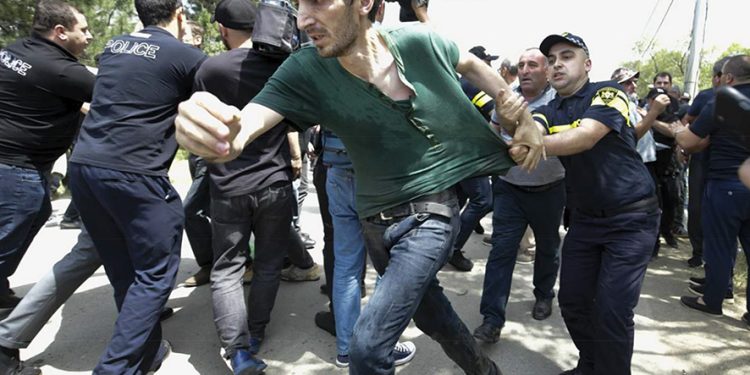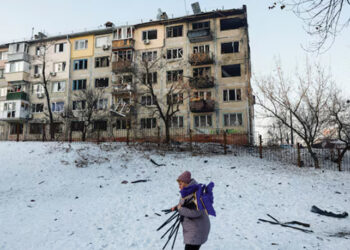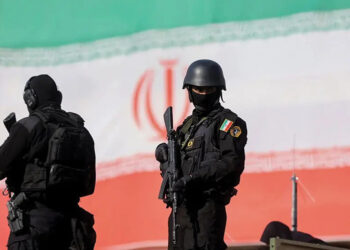Predictably, Georgia’s minority elements have again had to face the predations of violent anti-social groups in another high-profile incident. Mobs of people aligned with either anti-LGBT or pro-Russian, depending on who is asked, advanced on a festival that took place removed from the center of Tbilisi. Gathered at Lisi Lake and beset upon by these groups, organizers have not only lambasted them but also the authorities for their alleged support.
The LGBT community in Georgia has historically faced significant challenges. While progress has been made in legislative efforts for legal protection and recognition, practical application of protection by law enforcement and public safety elements remains a significant hurdle. Last weekend’s violence near Lisi Lake highlights the community’s ongoing struggle not simply for societal acceptance, but also for basic protection by security services.
While Georgia is largely a traditional country, with an overwhelming majority following the Georgian Orthodox Church, many of the younger generations have taken non-confrontational stances to the LGBT community. At best, they support their efforts, taking part in festivals and displaying solidarity with them. However, even at worst, they are indifferent and share no hostility with the community, leaving them to their activities and largely minding their own matters.
Despite this, there remain elements of resistance. While resistance to any ideology is expected and in many instances can spark healthy debate, the inclusion of violent radical groups poisons any potential for social development. Using any opportunity to engage physically with not only members of the LGBT community but anyone merely adjacent to them presents a serious threat to national stability, Western aspirations, and the rule of law in Georgia.
While not all of these violent groups can be confirmed to be associated with Russia or pro-Russian instigators, some have. Many have been linked to the Russian-linked political party Alt-Info, a group that has received money and support from nefarious elements to the north of the country. The opportunity to sour Georgia’s European progress is all too sweet of a prospect for these fringe groups.
Despite all this, the Lisi Lake attacks also show an interesting dichotomy in police and security forces response. According to the organizers of the Pride festival, “The police did not block the access road to the festival site in order to prevent the aggressive group [from approaching]. The police did not use proportional force against the attackers.” Law enforcement sources have said they were outnumbered and overwhelmed by the violent mobs, making it impossible to counter their raid.
Deputy Minister of Internal Affairs Aleksandre Darakhvelidze claimed that the mobs were able to outmaneuver police and find “ways to enter the area of the event, but we were able to evacuate the Pride participants and organizers.” In video circulating on social media, violent groups can be seen scuffling with police before breaking through, clawing their way towards the Pride festival.
While it is likely true, based on photo and video evidence, that the police efforts were in vain from an early point in the events leading up to the attack, questions as to why their response is so light linger. Georgian security forces have more recently not been shy in deploying significant resources to counter opposition. From armored vehicles, water cannons, and massed battalions of riot police, the nation has shown it has means of suppressing large groups of people.
Immediate examples only require one to go back to early March, when two nights of clashes between security forces and rioters shook the city center. Law enforcement deployed one of its most significant responses in years to combat protestors and rioters who opposed the now defunct “foreign agents” law. After hours of water cannons, tear gas, and rubber bullets, both nights ended in a complete dispersal of the remaining violent elements. Law and order was eventually restored, despite everything.
However, with a known history of there being combative actions against LGBT, or any pro-European group for that matter, Tbilisi’s law enforcement clearly displayed a weak response in Lisi Lake. Despite a storied history of groups using violence, deadly weapons, and boasting a willingness to do significant harm or even commit murder, the police failed to bring any of their aforementioned resources to bear.
The threat was not only visible before the clash began, but the terrain offered police the ability to deploy their full defensive force across an area broader than the tight city streets around Parliament.
Thus, any commander in the security forces elements should have been able to calculate an appropriate response that would halt any possible violence. Indeed, had the decision been made early enough during the initial rallies of the violent groups, visually deterrent resources could have been brought up. Units such as armored cars and water cannon trucks may have been positioned so as to dissuade or if needed halt even the most fanatical of the group’s members.
Not only would this have made the Ministry of Internal Affairs look like the nation’s finest and a truly reliable element of peace and security, but the political implications abroad would have been beneficial. However, news outlets and official statements abound about the fragility of Georgia and its inability to conform to Western standards. Sadly, people were injured and property was damaged or destroyed as a result.
While another sad and regrettable chapter in Georgia’s social development passes, hope springs eternal. It is unlikely the last we will see of these violent groups – because the nation’s security elements have not shown that such aggression and violence will not be tolerated, the country will doubtless have another unfortunate opportunity to try again.
By Michael Godwin














